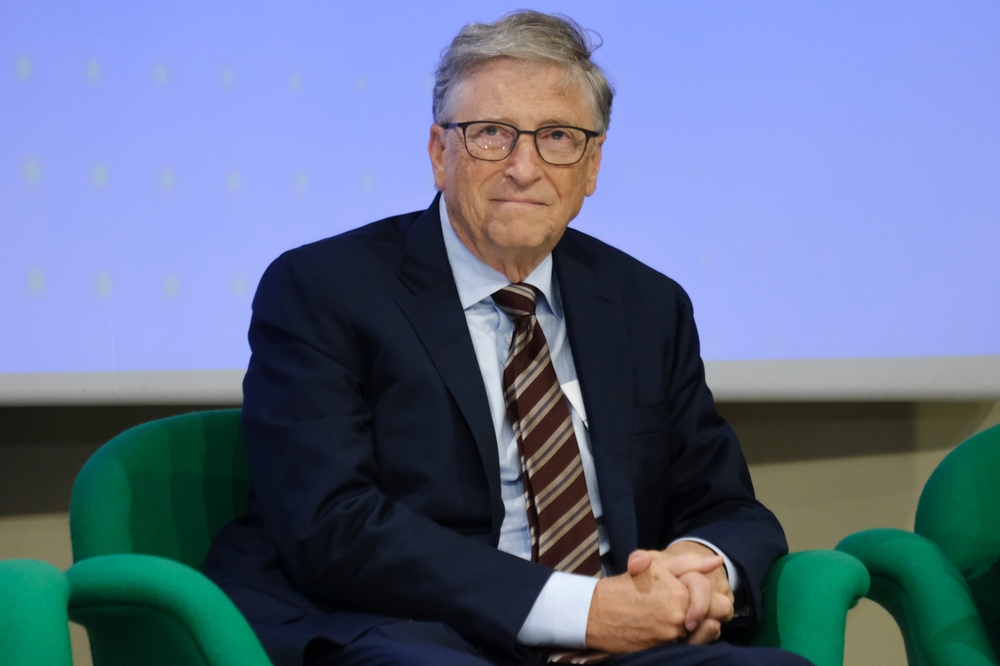Bill Gates Says AI Will Replace Doctors, Teachers and More in Next 10 Years, Making Humans Unnecessary ‘for Most Things’

What if the world you know today—your job, your skills, your expertise—no longer mattered in the next 10 years? Imagine a future where machines can perform most tasks better, faster, and more efficiently than any human. It may sound like a distant sci-fi reality, but Bill Gates, one of the world’s most influential innovators, believes this is the future that awaits us.
In a recent interview on The Tonight Show, Gates shared his bold prediction that artificial intelligence (AI) will soon replace professionals in fields like medicine, education, and even mental health. In his vision, humans may become unnecessary “for most things” as AI takes over jobs that were once seen as irreplaceable. While Gates remains optimistic about AI’s potential to improve our world, especially in tackling global challenges like healthcare and climate change, he also acknowledges the profound disruption it will bring.
So, where does that leave us? If AI becomes the backbone of our society, what happens to the human spirit, our creativity, our drive, our purpose? This article will explore Gates’ predictions, the benefits and risks of AI’s rise, and ultimately, what role we will play in an AI-driven world. The future of work, human connection, and even personal identity may soon be in the hands of machines. But the real question is: will we let it define us, or will we adapt and thrive in this brave new world?
Which Jobs Does Gates Think AI Will Take Over Soon?
So, which careers does Gates see AI moving into? He specifically pointed towards doctors, teachers, and mental health professionals. His reasoning centers on the idea of intelligence itself becoming widely accessible. Think about the knowledge and skills a great doctor or an inspiring teacher possesses – Gates believes AI is on track to replicate that kind of high-level cognitive ability and offer it for free, making it commonplace.
He presented this as a potential solution to persistent problems, like the shortage of medical practitioners or mental health support in many areas. Imagine getting quality medical advice or personalized tutoring readily available through an AI assistant. That’s the future Gates is sketching out.
Gates on Why AI Changing Work is Both Exciting and Worrying

While the idea of AI providing free, expert-level services is exciting, Bill Gates doesn’t shy away from highlighting the profound changes it will bring. On The Tonight Show, he raised the crucial question: “What will jobs be like?” As AI takes on tasks like diagnosing illnesses or teaching students, he suggested society could shift to shorter workweeks—perhaps just two or three days—since AI would handle much of the labor. This idea, while intriguing, also raises deep concerns about the future of human work.
Gates expressed genuine fascination with how AI could drive innovation, from solving health crises to addressing climate change. But he also acknowledged the uncertainty of this shift, calling it “a little bit unknown.” The rapid advancement of AI forces us to rethink our roles in the workforce, and Gates recognized why many are apprehensive. He pointed out that the speed of change is unsettling, and for many, it’s “a bit scary” to imagine a world where machines play such a dominant role.
Ultimately, the question isn’t just whether AI will replace jobs—it’s about how we will adapt to this new reality. Gates’ vision is one of opportunity, but also of caution, urging us to embrace AI’s potential while acknowledging the need to prepare for a future that feels, in many ways, like uncharted territory.
If AI Does Everything, What Will People Do?

This question naturally led to Jimmy Fallon’s direct inquiry: “Will we still need humans?” Bill Gates’ response was blunt: “Not for most things.” It’s a striking statement that forces us to confront the reality of an AI-driven world. Yet, Gates quickly followed up with a reassuring thought: humanity will ultimately decide which roles remain reserved for people. His example? Baseball. He suggested that while AI could handle nearly everything else, watching computers play baseball just wouldn’t capture the human spirit that makes the game so beloved.
Gates acknowledged that AI would eventually take over tasks like production—“making things, moving things, and growing food”—which he believes will be “basically solved” over time. As efficiency continues to rise, these once labor-intensive jobs could become obsolete. However, Gates emphasized that people will likely still value activities that hold deeper meaning than mere efficiency. Sports, arts, and community engagement are areas where humans will likely retain control, driven by the desire for connection, creativity, and shared experiences. These are the spaces where human presence and authenticity matter most.
While AI will undoubtedly revolutionize how we work and live, Gates suggests we’ll continue to reserve certain roles for ourselves, particularly where human connection and experience are at the heart of what we do. The balance will lie in understanding where AI can complement humanity without replacing what makes us uniquely human.
Where Gates Sees AI Helping Us

Despite the potentially unsettling implications of AI replacing many jobs, Bill Gates remains hopeful about its broader, transformative potential. When Jimmy Fallon asked what fuels his optimism, Gates pointed to two critical areas where he sees AI making a profound, positive impact: healthcare and climate change. In healthcare, Gates sees AI as a game-changer, with the potential for breakthroughs in treating diseases that have long challenged medical science. He mentioned Alzheimer’s disease and the fight to eradicate polio as prime examples of where AI could significantly advance medical research and improve lives.
Gates also expressed confidence in AI’s ability to address one of the most urgent crises facing humanity: climate change. He views AI as a powerful tool to drive innovation, helping us develop new technologies to reduce carbon emissions, create sustainable energy solutions, and protect the planet for future generations. His optimism is grounded in the fact that he has a front-row seat to this innovation, given his work with the Gates Foundation and other initiatives. “There’s a lot of great stuff coming along,” he said, offering a sense of hope that the technology could offer not just solutions to today’s problems, but also a brighter future for all.
For Gates, AI’s potential isn’t just about replacing tasks—it’s about unlocking new possibilities that can help solve the world’s most pressing issues. His outlook remains optimistic, driven by the belief that the best is yet to come.
Why Gates is Thinking About AI’s Future Right Now

It’s important to consider the context in which Bill Gates shared his bold views on AI. He wasn’t just discussing the future of technology—he was also promoting his debut memoir, Source Code. This book takes readers on a journey through Gates’ childhood, upbringing, and the formative experiences that led him to co-found Microsoft. However, beyond personal reflections, Gates’ remarks about AI were also deeply tied to an upcoming convergence of significant milestones in his life.
Gates shared with PEOPLE magazine that the year 2025 holds special meaning for him. It marks not only his 70th birthday but also the 50th anniversary of Microsoft and the 25th anniversary of the Gates Foundation. This alignment of personal and professional milestones has prompted him to reflect on his journey, not just as a tech mogul but also as someone who has been at the forefront of transformative change. With AI poised to reshape the world in ways we can’t fully predict, Gates finds himself thinking deeply about how these innovations will continue to impact not only his legacy but also the future of humanity.
Could We Really Work Just 2 Days a Week Because of AI?

When Bill Gates talked on The Tonight Show about artificial intelligence potentially stepping into professional roles like doctors and teachers, it wasn’t just about which jobs might change. He also touched upon how work itself might transform. As he considered a future where AI handles many tasks currently done by people, he raised some pretty big questions about our daily lives.
One of the most intriguing thoughts he shared was about the structure of our work schedules. If AI substantially increases productivity and takes over many necessary functions, would we still need the traditional five-day workweek? Gates floated the possibility aloud, asking, “What will jobs be like?” and “Should we just work like two or three days a week?”
The idea stems directly from the potential efficiency gains AI could bring. If software and robots handle manufacturing, logistics, administration, and even some intellectual tasks, the amount of human labor required to keep society running might decrease dramatically. This would allow us to rethink our time, perhaps dedicating less to formal employment and more to personal interests, family, or community activities.
Gates presented this shorter workweek not as a definite forecast, but as one of the profound possibilities that arise when a technology like AI promises such broad changes. It’s part of the “And so, legitimately, people are like, ‘Wow, this is a bit scary.’ It’s completely new territory,” he mentioned – exciting to consider, yet wrapped up in the broader uncertainty of how exactly society will adapt to machines taking on so much work. The two-day week remains a speculative idea, but one prompted by the potentially massive shift in productivity that AI could unlock.
Getting Ready for the AI-Powered Future

Bill Gates has outlined a future where artificial intelligence doesn’t just assist humans—it actively replaces them in many professional roles within the next decade. He predicts that intelligence will become abundant and inexpensive, reshaping the very fabric of work and sparking a wave of uncertainty about what it means to be human in this new world. As AI takes over tasks like production and logistics, it could free up human time, but it also raises the question: how will we find purpose when machines handle so much of our daily lives?
Despite these challenges, Gates remains hopeful about AI’s potential to address some of the world’s most pressing issues. From breakthroughs in healthcare to innovations in climate solutions, he believes AI will play a pivotal role in shaping a better future for all. Having witnessed firsthand the transformative power of technology, Gates’ vision offers both a warning and a promise. We may be on the verge of another profound shift in how we live and work, one that will fundamentally change our world in ways we’re only beginning to understand. The next ten years, according to Gates, could be unlike anything we’ve experienced before. The question now is: are we ready to embrace the AI-powered future that lies ahead?
Featured Image Source: Shutterstock
Loading...






